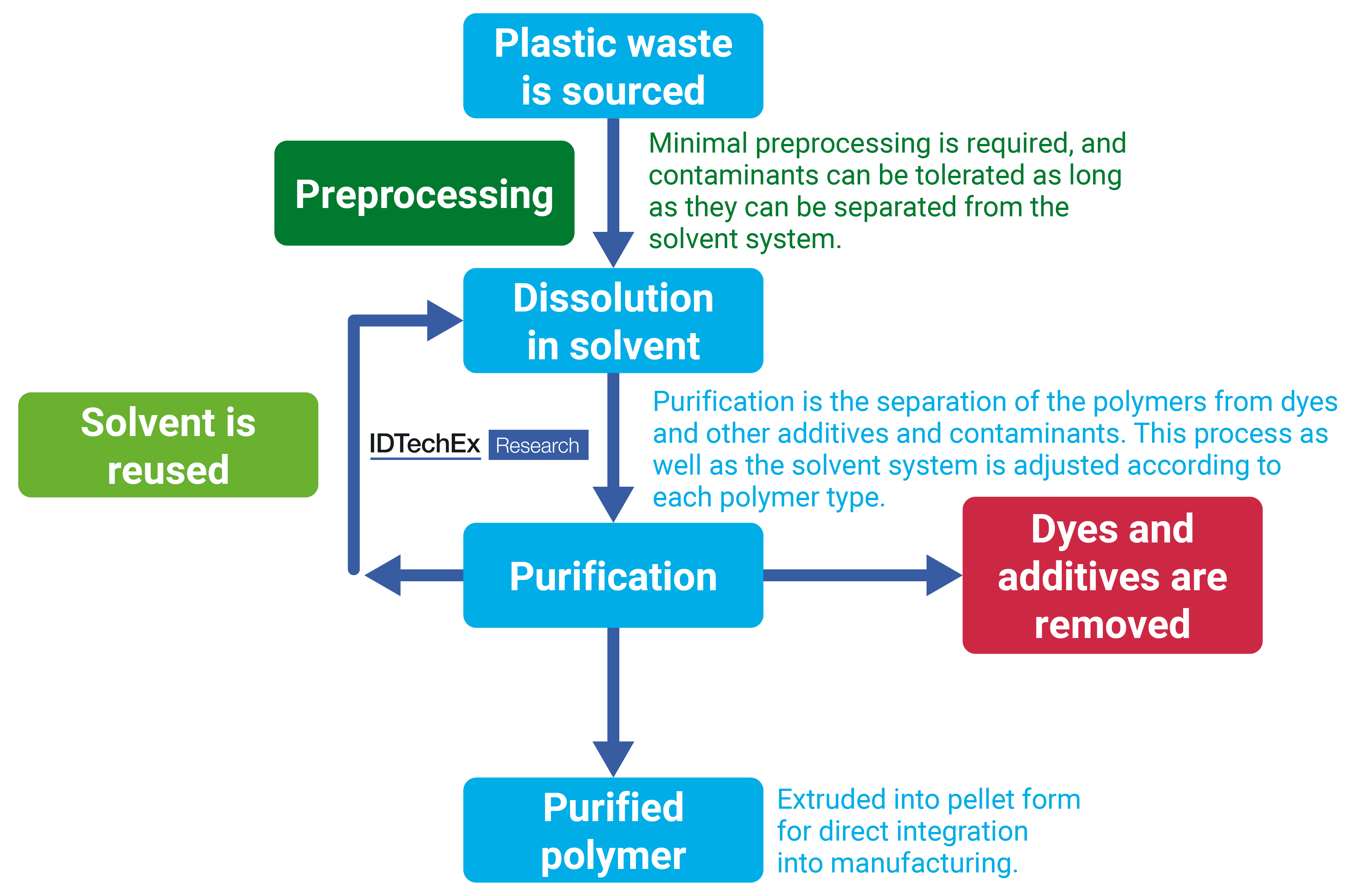By James Kennedy, a know-how analyst at market intelligence agency IDTechEx.
The superior recycling marketplace for plastics predominantly focuses on applied sciences like pyrolysis and depolymerization (thermal, chemical, and enzymatic). To a lesser extent, strategies equivalent to gasification and hydrothermal liquefaction are additionally being explored. Nevertheless, these applied sciences face rising scrutiny and restrictions in some areas attributable to their environmental impression. Nevertheless, whereas mechanical recycling is the popular recycling methodology attributable to its cost-effectiveness and effectivity, it nonetheless falls quick in purposes requiring excessive purity and mechanical properties. To deal with these challenges posed by each chemical recycling applied sciences and mechanical recycling, dissolution applied sciences (typically known as solvent extraction) supply a promising resolution.
Dissolution defined
Dissolution entails separating polymer waste utilizing a solvent. The solvent selectively dissolves the polymer, separating it from contaminants and different non-target supplies. As soon as dissolved, the answer is purified, and the solvent is eliminated, forsaking a virtually pure plastic that may be processed again into granules for reuse in manufacturing.
This methodology can cope with contaminated or combined plastic waste that’s difficult to recycle by way of mechanical means whereas not breaking the polymers into their constituent molecules or feedstock. The necessity to rigorously separate totally different polymer sorts is decreased, as plastic sorts might be selectively dissolved and separated out when utilizing the right solvent combination. The processes are designed with solvents and separation strategies for particular plastic sorts equivalent to polypropylene, polystyrene, and acrylonitrile butadiene styrene.
PureCycle Applied sciences is a notable participant within the discipline of plastic dissolution. The corporate makes use of a proprietary know-how developed by Procter & Gamble to recycle polypropylene. Its course of entails utilizing a solvent (primarily n-butane) to purify waste polypropylene right into a type that’s comparable in high quality to virgin plastic. PureCycle states that its recycled PP can be utilized in purposes the place mechanical recycling strategies, equivalent to food-grade packaging, wouldn’t suffice. PureCycle is presently the main commercial-scale supplier on this area.
The important thing benefit of dissolution is the upper theoretical general yield that it will probably present in comparison with chemical recycling applied sciences, because the product re-enters the plastic provide chain as a ready-for-use resin moderately than merely a polymer constructing block or a hydrocarbon.
As a comparatively nascent trade, there may be persevering with R&D on its processes. One standout is Solvent-Focused Restoration and Precipitation (STRAP), which is a brand new know-how framework that researchers on the College of Wisconsin-Madison have developed. The know-how can separate the elements of multilayer plastic movies and take away contaminants. Multilayer movies are a key problem in plastic waste administration, and consequently, the commercialization of this know-how has sturdy potential. Moreover, the builders of STRAP declare the method has many benefits over rivals, together with operation at atmospheric stress and decrease temperatures. At current, a STRAP pilot plant is being constructed at Michigan Tech College to show the know-how. The promise of a extremely adaptable dissolution system for any such hard-to-recycle plastic waste can be probably the most sought-after resolution. The technical challenges of scaling STRAP will doubtless imply a number of years earlier than that is at a industrial scale.

The final course of for the dissolution of plastic waste (supply: IDTechX). Click on picture to enlarge.
Dissolution drawbacks
Whereas dissolution know-how holds promise, it isn’t with out its challenges and criticisms. For instance, there are questions on long-term circularity because the polymer is more likely to degrade over successive biking. One other concern with the dissolution course of is the environmental impression of the solvents used. These chemical compounds have to be managed rigorously to keep away from releasing dangerous substances into the setting. The vitality required to warmth the solvents and subsequently take away them from the dissolved plastic additionally provides to the carbon footprint of the method.
The financial viability of dissolution know-how additionally stays unsure. The price of the solvents, vitality consumption, and the necessity for stylish infrastructure will doubtless make recycled polymers from dissolution crops costlier than with mechanical recycling strategies. The dimensions of this inexperienced premium versus different recycling applied sciences will decide whether or not dissolution crops might be economically viable.
Moreover, the size required to make a big impression on plastic waste by way of dissolution is immense. Constructing the mandatory infrastructure to course of massive volumes of plastic waste by way of dissolution is a large endeavor that can require substantial capital funding and time.
The success of dissolution applied sciences like PureCycle’s depends upon market demand for recycled plastics. Whereas there may be rising curiosity in sustainable supplies, competitors from cheaper, virgin plastics can restrict the market potential for recycled merchandise. Future efforts will deal with growing processes for a wider vary of polymer sorts. Firms equivalent to APK, Worn Once more, and Polystyvert are working with polyethylene (PE), polyethylene terephthalate (PET), and polystyrene (PS), respectively. The Netherlands Group for Utilized Scientific Analysis (TNO) is growing a course of known as Mobius for recycling acrylonitrile butadiene styrene (ABS), although it isn’t but commercialized.
Dissolution presents a promising know-how for addressing the demand for low-carbon, versatile plastic waste options. Nevertheless, a number of hurdles stay, together with technological refinement, industrial scaling, and financial challenges. Stakeholders should rigorously consider the advantages and downsides of dissolution inside the broader context of world waste administration methods. Navigating financial challenges will likely be key, as value would be the determinant think about success as firms adopting recycled polymers consider how a lot of a inexperienced premium they will afford. Continued analysis, funding, and regulatory help will likely be important to refine the method and assess its long-term viability as a part of a complete effort to mitigate the impression of plastic waste on the setting.